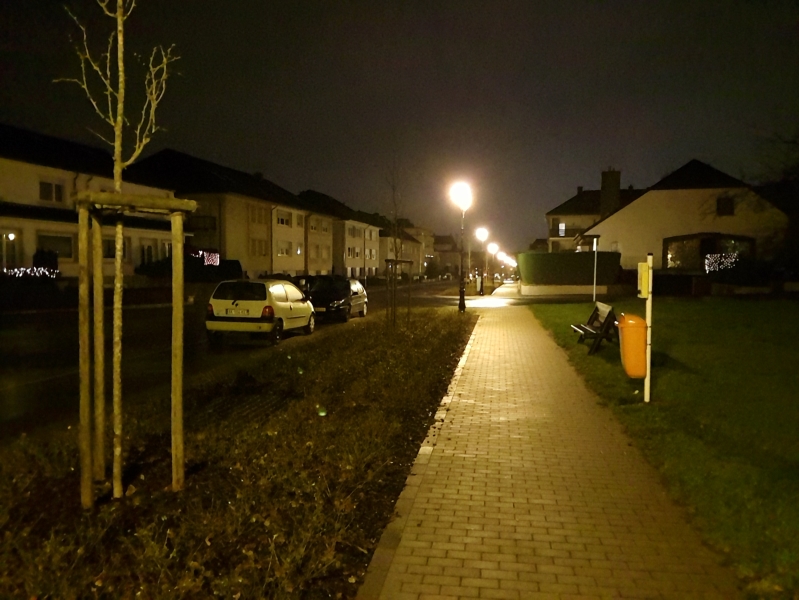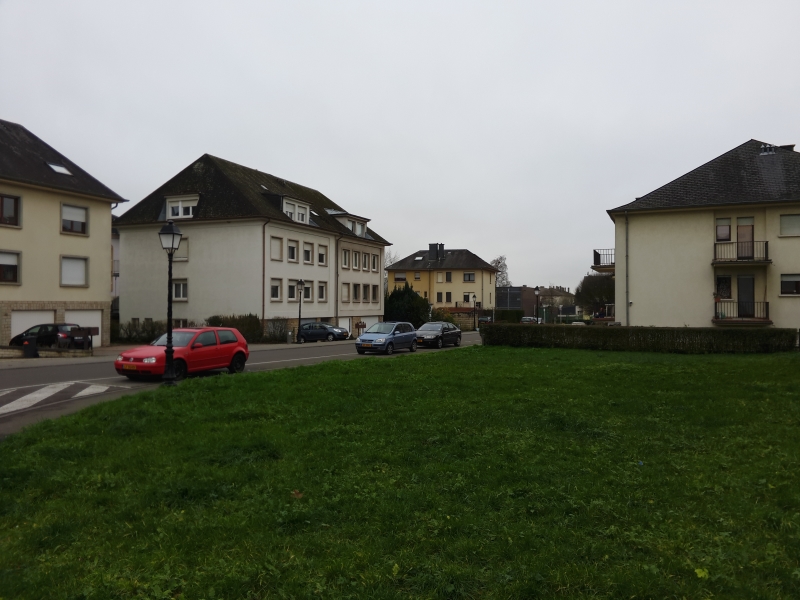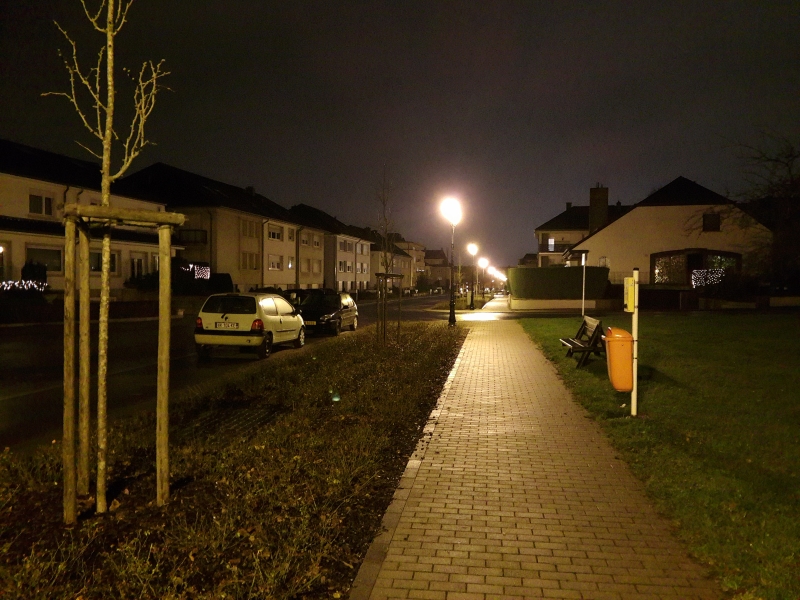The Meizu MX4 Pro Review
by Andrei Frumusanu on February 16, 2015 2:00 AM EST- Posted in
- Smartphones
- Exynos
- Mobile
- Meizu
Camera - Still Pictures
Meizu's back shooter comes with a 20.7MP Sony IMX220 camera sensor together with a F/2.2 aperture, ISP 5-piece lens main camera. The sensor is a 1/2.3" format with 1.2µm sized pixels. There is no OIS or special AF functionality in the module, which makes this a more simplistic camera to examine.
In my cloudy December months the device was able to capture a good amount of detail thanks to the 20.7MP resolution of the sensor. I did notice that the camera tends to underexpose just a tad from reality, making pictures appear darker than they should be. Auto mode shooting during the day seems to like to default to 1/50s exposure on ISO-40. There is little noise in the pictures and shooting latency is good. However, when using HDR the device struggles as taking an HDR shot can take up to 3-4 seconds. I'm not sure what's wrong here but it seems Meizu isn't employing the sensor's HDR capabilities but falls back to software or ISP processing.

Location 1:
Location 2:
The differences in post-processing are especially visible when comparing a 100% crop to the likes of the Note 4. Although the Note has OIS, the major differences are to be found in the sharpening and saturation of colors. Again here it seems that Meizu doesn't employ a companion ISP that enables such post-processing.

1/25s ISO-2000 Night shot (5MP)
When switching over to night shots there is a conundrum of choice between using a slow but otherwise excellent quality HDR mode, or to switch over to a dedicated night shot mode. In the night shot mode it seems that the sensor is employing pixel binning as maximum resolution is limited to just 5MP. The resulting picture loses a lot of detail and sharpness but capture time is excellent and allows for quick shooting in darkness.

Normal mode:
HDR:
Trying to shoot in darkness in the normal mode is a futile exercise as the camera simply isn't able to cope and will result in underexposed shots. In my everyday usage I found the night shot mode to have too great of a picture quality sacrifice due to the 1/4 resolution limitation, so HDR is the only viable alternative. The Meizu still manages to provide very good image results for a non-OIS shooter and leaves the likes of the Honor 6 and Mate 7 in the dust when it comes to night-time shooting.
Lastly the panorama function was severely disappointing, as the phone couldn't hold a steady exposure and there is obvious stitching in the resulting 14512x2464 image. There is also significant motion blur throughout the image. I panned relatively slowly when taking the panorama so such a result is disappointing.
Overall I think the still camera performance of the Meizu MX4 Pro is solid. It's possible to take excellent quality pictures in bright conditions, and shooting in the dark works provided you're willing to sacrifice resolution. While image quality is not comparable to OIS devices, the MX4 Pro outperforms every other competing device in detail and quality. The one area of concern is the slow HDR mode as the processing time is excessive and disrupts fast camera usage.
Camera - Video Recording
2160p30
Note 4 Exynos reference: [ 2160p30 ]
The MX4 Pro supports 4K video recording at 30fps. The camera produces a 32.6Mbps H.264 High Profile 5.1 video stream together with stereo 96Kbps AAC audio in an MP4 format. The image quality produced is quite good; the YouTube re-encode doesn't do it justice as a lot of detail is lost. It's the lack of OIS and any EIS in this 4K video mode that is most disappointing, as trying to capture a video while moving becomes a shaky mess. A 30 second video sample comes in at a massive 120MB. There is no limit on recording length, but it's quite possible to quickly fill up the internal storage space of the device at such a rate.
1080p30
Note 4 Exynos reference: [ 1080p30 , 1080p30+EIS , 1080p60 , 1080p60+HDR ]
When moving over to 1080p there is a sudden change in picture tone as all colors get much more saturated. What seems to be happening here is that there is actual post-processing done in the 1080p stream. I think this may be related to ISP performance not being able to cope with the 4K stream. It seems because of either this post-processing or because the sensor isn't capturing at its full resolution that there is a large and discernable loss of detail. The video stream bitrate goes down to 18Mbps in the FHD mode.
720p30
Note 4 Exynos reference: [ 720p30 , 720p30+EIS ]
At 720p there is finally some kind of EIS being enabled on the device, as the stock camera application doesn't provide any manual controls for enabling or disabling EIS. What is curious is that the video stream only drops to 16Mbps compared to 1080p's 18Mbps bitrate, making for better image quality in moving subjects. Again we're seeing a significant loss of detail and I can even start seeing chromatic aberrations on contrasted edges such as the tree branches.
720p100 Slow Motion
Meizu offers a separate camera mode that is essentially a 100fps slow motion recording mode in 720p resolution. I found it odd that the resulting video file's meta-data retains the real-time video recording length instead of the actual playback length. The above sample video contains a 20 second capture time that is stretched to a video playback time of little over 80 seconds, meaning we're recording at 4x slow motion.
The MX4 Pro's video recording capabilities remain borderline satisfactory due to the lack of a more effective EIS implementation. The 4K mode is definitely the most impressive due to the amount of detail that is being retained from the sensor, but it's hampered by storage space due to the lack of a microSD card.


























70 Comments
View All Comments
blackmagnum - Monday, February 16, 2015 - link
Have you checked that it was not programmed with a backdoor that could access your personal information? Right? Just checking.WorldWithoutMadness - Monday, February 16, 2015 - link
Well, you can't really know. What if they installed it from the hardware to software?If you don't trust these technologies then just buy your own country phone. Even if they do access your personal information, you can blame your country for it
Murloc - Monday, February 16, 2015 - link
most of the stuff in any phone is made in China so...StevoLincolnite - Monday, February 16, 2015 - link
They can spy on me.I only look at cat video's anyway.
bigstrudel - Friday, February 20, 2015 - link
You're a happy slave. Keep paying your taxes buddy. And invest in the stock market.theduckofdeath - Tuesday, February 17, 2015 - link
The SoC is made in Korea. Apart from that, I think Apple trolls on this site are just about as pathetic as trolls on the internet can get. Virtually all smartphones in the world are assembled in China, except for a few high end Samsung devices and maybe an LG or two. That includes brands like Microsoft and Apple.twoD - Monday, February 16, 2015 - link
Agree.While you at it, also check Apple and Google. They've known to be sharing personal info with the NSA.
Just saying.
melgross - Monday, February 16, 2015 - link
Don't make things up please.bigstrudel - Friday, February 20, 2015 - link
Its not made up. Do some homework. All the info you need to draw your own conclusion is on the internet.Or you could keep getting all of your info spoon fed to you by corporate media who basically just want you to buy stuff and watch commercials.
deadlockedworld - Monday, February 16, 2015 - link
Apple and Google have been pretty good about fighting for public transparency in their national security cooperation. Both are taking heat from the government for encrypting consumer devices and data. Its Verizon and ATT that are fully onboard with giving everything to the NSA.